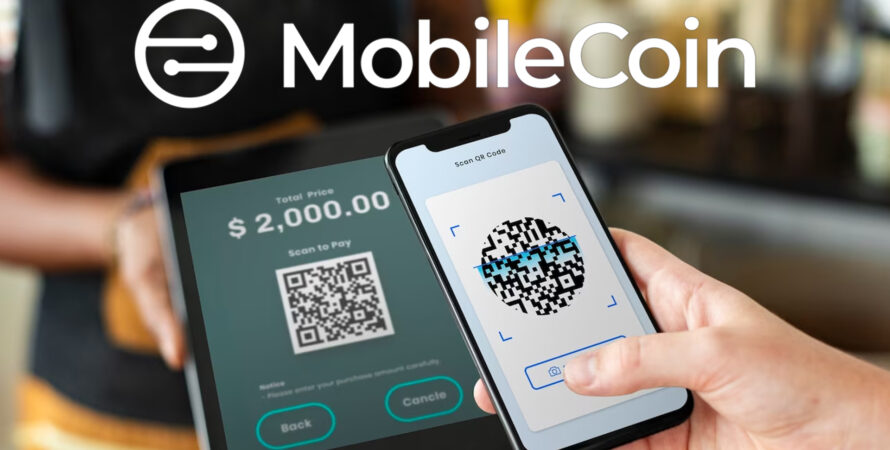- MobileCoin is a cryptocurrency with its own encrypted blockchain, designed to overcome problems of Bitcoin and other crypto.
- Many issues like computational requirements and transfer speed have prevented crypto from becoming usable for everyday payment transactions.
- Mobile usage optimization was enabled due to privacy-coupled speed and extremely low energy consumption, which is the ultimate USP of the network.
MobileCoin is a cryptocurrency developed to address major issues faced by contemporary cryptocurrencies, especially Bitcoin. It is a highly optimized decentralized currency with the aim to resolve crypto’s four fundamental problems — privacy, transaction speed, environmental footprint and adaptability for mobile devices.
It is the first cryptocurrency specifically designed to be used on mobile phones. This enables users to carry it anywhere, and perform instant real-time mobile payments for everyday use. It has state of the art privacy features to provide one with the highest levels of data opaqueness at ultra high speed transactions.
Basic Working Principles of MobileCoin
MobileCoin is an open source peer-to-peer decentralized payments platform developed by MobileCoin Inc. in 2017 by Joshua Goldbard and Shane Glynn. The mainnet, which was the company’s own encrypted blockchain, went live in December 2020.
The consensus mechanism adopted by the network is the Federated Byzantine Agreement (FBA) model, which is the reason for the company’s claimed near-zero energy consumption. FBA is a subtype of Byzantine Fault Tolerance (BFT) Agreement. BFT is a consensus mechanism in which consensus is achieved even if there’s a fault in presentation of certain nodes, given all of the nodes have solved the Byzantine Generals’ Problem – a puzzle for consensus algorithm.
The FBA is an improvement over BFT making it more secure and decentralized. In this, instead of obtaining consensus from all the nodes, it randomly selects some nodes to attain consensus.
The network is specially optimized to be used on mobile phones so that any number of very small transactions can be carried out anywhere anytime. With a user-friendly interface, it can be accessed on normal computers and mobile devices easily.
The company is associated with the decentralized end-to-end encrypted messaging app, Signal, as its main partner for messaging service provider. Thus, the cryptocurrency app runs on a mobile phone and uses Signal for its message transfer. The privacy protection is so high, even Signal cannot decipher the messages at all.
Cutting Edge Technologies Adopted by the Network
The network is secured by the Federated Byzantine Agreement consensus, which builds on Stellar Consensus Protocol (SCP), an FBA model developed by Stellar, a blockchain network protocol for fiat money transfers. In SCP, the nodes decide by voting on every content of the block to reach a consensus instead of waiting to resolve internode conflicts.
In MobileCoin, the participants of FBA are parties on remote cloud services. This requires the need to make additional security layers to hide data from the off-chain centralized parties. For this, the network uses multiple security layers and an extensive usage of various subsets of Zero Knowledge Proofs (ZKP) to protect transactions from being hacked and preserve user privacy.
The ledger uses CryptoNote encryption protocol, along with One-Time Addresses to hide the transaction ids. Furthermore, the amount of the transactions is kept hidden by Ring Confidential Transaction (RingCT), a technique first developed by Monero, a cryptocurrency blockchain.
This combination of multiple tactics hides the transaction outputs in such a way that only the receiver and sender will know the contents of transaction. Not even Signal will be able to retrieve information while mediating the data. Furthermore, the accuracy of the amount transferred is protected by ZKPs of Rangeproofs or Bulletproofs.
The specialized technology to secure transactions on a mobile phone was devised by the company – MobileCoin Fog. The problem with mobile phones is surveillance by messaging app service providers. This happens due to a software requirement to make the application mobile phone optimized, which, in this case, is Intel SGX (Software Guard Extensions).
The MobileCoin app is Intel SGX-capable, but this is a compromise on transaction encryptions. For this, the app uses Secure Enclaves software. Fog encrypts messages end-to-end, essentially making the data on Cloud storage opaque. Data accuracy is ensured here by a computing software protocol – Remote Attestation, which signals the software about the code being run.
It also does not require users’ private keys to process; thus, data transmission remains opaque. This is facilitated by a technique called Oblivious RAM (ORAM). MobileCoin is the first implementation of ORAM that is production-grade and open source.
The receiver and sender addresses are concealed via two cryptographic techniques – Ring Signatures and Pedersen Commitment ZKPs, which generate One-Time Addresses. These are verified using Merkle Proofs technique, which enables the receiver and sender to access their One-Time Addresses through actual addresses.
The energy consumption of the network is said to be extremely low, of the order of that consumed by a city’s neighborhood. Currently, it is estimated around 36,000 kWH per year, which is a substantially less amount than a Proof-of-Stake blockchain.
The MOB Coin
MOB coin is the native cryptocurrency used by MobileCoin and the entire ecosystem to enable ultra-fast payments, no matter how small. It is also used to pay network gas fees. The coin has a limited supply of 250,000,000 MOB.
At the time of writing the article, the price of MOB is 0.574,598 USD. Which is a 4.73% decrease over the last 24 hours. The current 24-hour trading volume is 772,085 USD. Current circulating supply is 195,286,109 MOB. The current market cap is 112,180,826 USD, which is a decrease of 3.87% over the past 24 hours.




